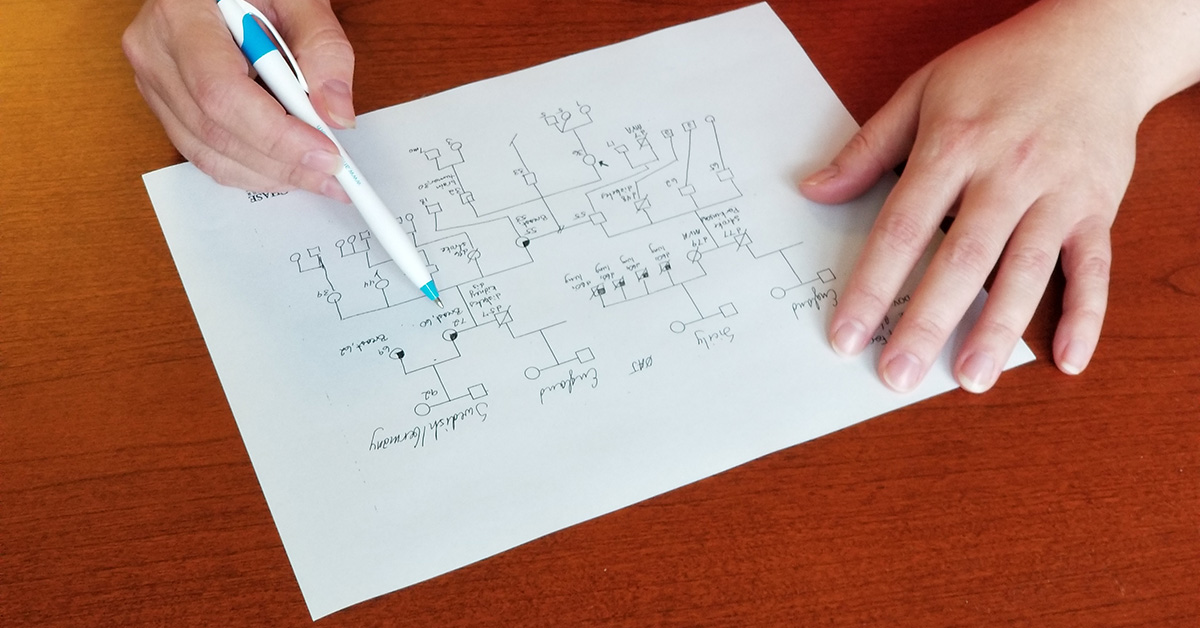
Understanding Lynch Syndrome and the Risk of Cancer
-
Lynch syndrome is an inherited disorder that increases the risk of many types of cancer, particularly cancers of the colon and uterus. Around 1 in 279 people may carry a mutation in one of the genes associated with Lynch syndrome. Knowing if you or a loved one have this syndrome can help you make important decisions about screening for certain types of cancer, as well as potentially impact your treatment if you’re faced with a cancer diagnosis.
What is Lynch syndrome?
Lynch syndrome is also known as hereditary nonpolyposis colorectal cancer (HNPCC) and is the most common hereditary colorectal cancer syndrome. Those who have it are genetically predisposed to developing certain types of cancer. This means that people with Lynch syndrome have higher than average risks of developing cancer. Lynch syndrome is an inherited disorder that is caused by mutations in a number of genes called the mismatch repair genes. These mutations prevent the proper repair of DNA replication errors. This build-up of errors in the DNA can cause abnormal cell growth, and uncontrollable cell growth can possibly lead to cancer formation.
This syndrome is most strongly linked to higher lifetime risks for colorectal, endometrial, and ovarian cancer. It’s also tied to a small increase in the risk for stomach, liver or bile duct, urinary tract, small bowel, and pancreatic cancers, as well as brain and central nervous system tumors.
“Having the condition doesn’t guarantee a future cancer diagnosis,” said Michelle Savage McSweeny, MS, LCGC, a genetic counselor at Fox Chase Cancer Center. “But knowing if you have Lynch syndrome can help you decide if you want to undergo additional screening measures, as well as encourage others in your family to find out if they have it as well.”
Factors that increase your risk
People with Lynch syndrome inherit one of the syndrome’s gene mutations from their mother or their father. Still, “most people have no idea that they have it,” McSweeny said.
Since Lynch syndrome raises the risk for certain cancers, providers often decide whether someone should get Lynch syndrome testing based on individual and family cancer history. These include criteria like:
- Having colorectal or endometrial cancer before age 50
- Being diagnosed with colorectal cancer and another Lynch syndrome-associated cancer
- Having a history of colorectal cancer or other Lynch syndrome-associated cancers occurring before age 50 in one or more first-degree relatives
- Having a history of colorectal cancer or other Lynch syndrome-associated cancers occurring in two or more first- or second-degree relatives
People who are diagnosed with colorectal or other cancers associated with Lynch syndrome should also be tested if their tumors show certain abnormalities.
“At Fox Chase, anyone who has colorectal or uterine cancer, when they have their surgery, we automatically screen their tumors for Lynch syndrome,” McSweeny said. “If an abnormal tumor shows a possibility of Lynch syndrome, we recommend genetic testing.”
Lynch syndrome genetic testing
Lynch syndrome is diagnosed through a simple blood or saliva test. “The testing should be performed through a genetic counselor,” McSweeny noted.
Your counselor can help you determine what Lynch syndrome means for managing your cancer risk. “With colonoscopy screenings, we’ll start as early as age 25 and perform the screenings every one to two years,” McSweeny said. Women should also have regular pelvic examinations and some consider ultrasounds and endometrial biopsies. Risk-reducing surgery is also an option for women with Lynch syndrome to consider to reduce their risks of developing endometrial or ovarian cancer.
Testing positive for Lynch syndrome can also affect treatment for an existing cancer diagnosis. “We know patients with Lynch syndrome benefit significantly from immunotherapies,” McSweeny said.
Lastly, you can take steps to help others in your family who might also be affected.
“We’d recommend testing for parents if they’re still living,” McSweeny said. “If you find out it’s coming from one side of the family, aunts, uncles, and cousins on that side could also be at risk. It can also influence when a patient’s children would start their colorectal cancer screening.”
Genetic testing at Fox Chase
The Risk Assessment Program at Fox Chase can help individuals and their families evaluate their risk for cancer, including Lynch syndrome. Our team of physicians, nurses, and genetic counselors offers the most comprehensive risk assessment program in the Philadelphia region. To make an appointment with one of our clinical genetic specialists, call 877-627-9684.
